Project Governance and Contracts Report on Case Study: MGMT 7
VerifiedAdded on 2022/12/26
|18
|4260
|56
Report
AI Summary
This report analyzes a case study involving a CEO facing decisions about project governance and contractual arrangements for construction projects. The report focuses on comparing and contrasting two primary contractual models: Engineering, Procurement, and Construction (EPC) and Engineering, Procurement, and Construction Management (EPCM). It provides detailed descriptions of each model, highlighting their roles, responsibilities, and risk profiles. The report also explores the advantages and disadvantages of both EPC and EPCM arrangements, including aspects like cost control, flexibility, and the allocation of risk between the project owner and the contractor. Ultimately, the report aims to provide the organization with a comprehensive understanding of both contractual arrangements to aid in the selection of the most appropriate model for their specific project needs. This report offers a comparative analysis of the EPC and EPCM models to support informed decision-making.
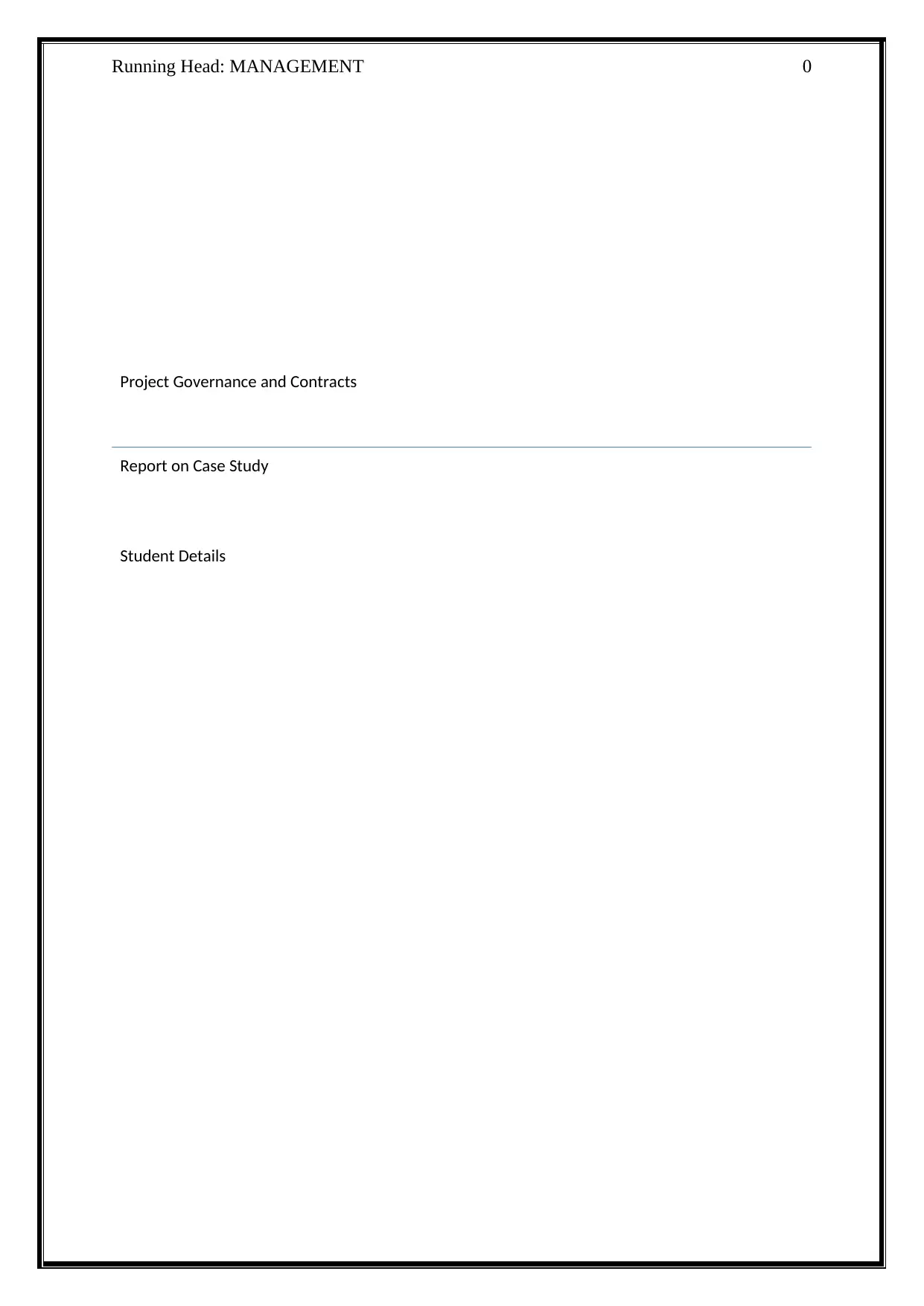
Running Head: MANAGEMENT 0
Project Governance and Contracts
Report on Case Study
Student Details
Project Governance and Contracts
Report on Case Study
Student Details
Paraphrase This Document
Need a fresh take? Get an instant paraphrase of this document with our AI Paraphraser
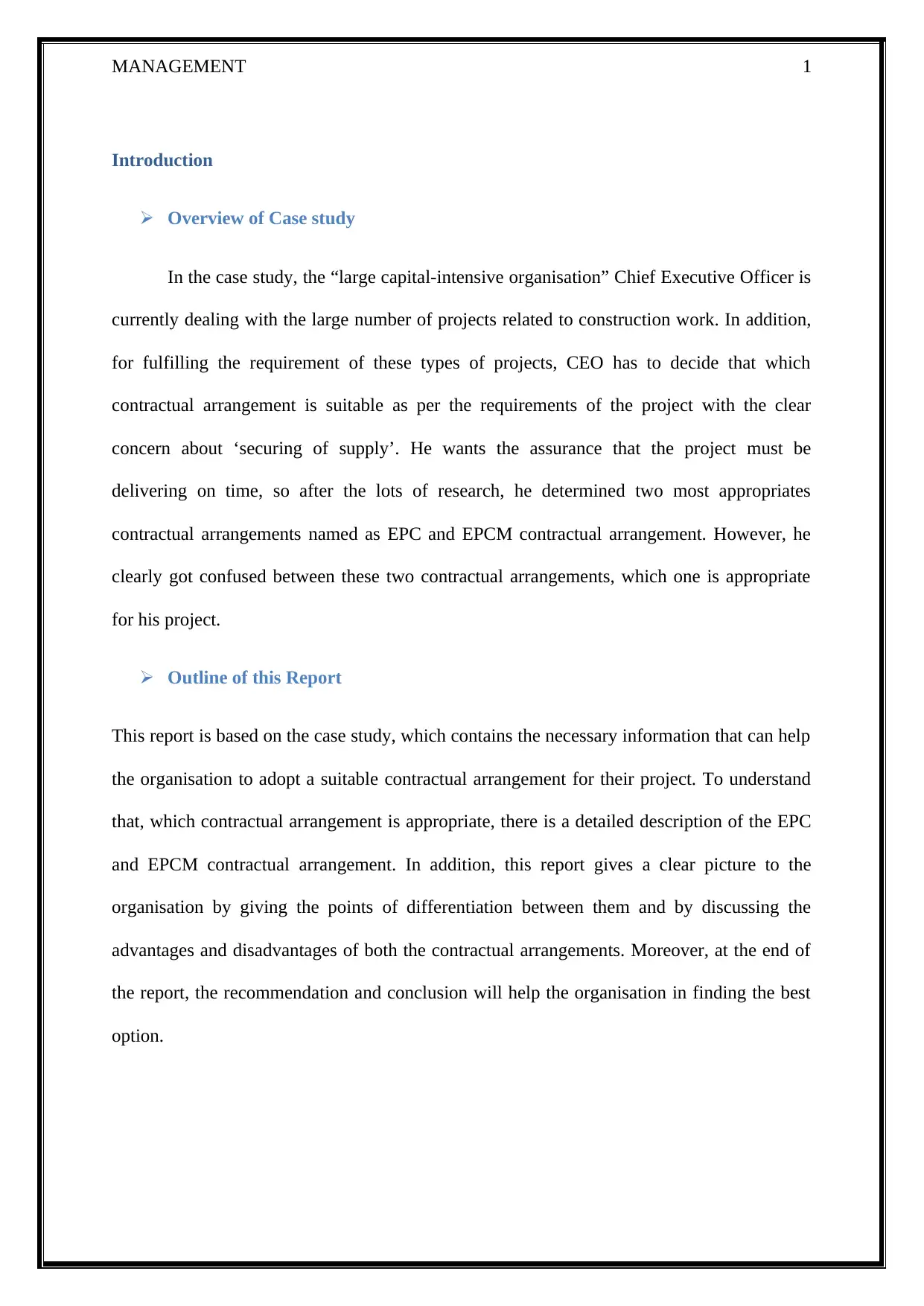
MANAGEMENT 1
Introduction
Overview of Case study
In the case study, the “large capital-intensive organisation” Chief Executive Officer is
currently dealing with the large number of projects related to construction work. In addition,
for fulfilling the requirement of these types of projects, CEO has to decide that which
contractual arrangement is suitable as per the requirements of the project with the clear
concern about ‘securing of supply’. He wants the assurance that the project must be
delivering on time, so after the lots of research, he determined two most appropriates
contractual arrangements named as EPC and EPCM contractual arrangement. However, he
clearly got confused between these two contractual arrangements, which one is appropriate
for his project.
Outline of this Report
This report is based on the case study, which contains the necessary information that can help
the organisation to adopt a suitable contractual arrangement for their project. To understand
that, which contractual arrangement is appropriate, there is a detailed description of the EPC
and EPCM contractual arrangement. In addition, this report gives a clear picture to the
organisation by giving the points of differentiation between them and by discussing the
advantages and disadvantages of both the contractual arrangements. Moreover, at the end of
the report, the recommendation and conclusion will help the organisation in finding the best
option.
Introduction
Overview of Case study
In the case study, the “large capital-intensive organisation” Chief Executive Officer is
currently dealing with the large number of projects related to construction work. In addition,
for fulfilling the requirement of these types of projects, CEO has to decide that which
contractual arrangement is suitable as per the requirements of the project with the clear
concern about ‘securing of supply’. He wants the assurance that the project must be
delivering on time, so after the lots of research, he determined two most appropriates
contractual arrangements named as EPC and EPCM contractual arrangement. However, he
clearly got confused between these two contractual arrangements, which one is appropriate
for his project.
Outline of this Report
This report is based on the case study, which contains the necessary information that can help
the organisation to adopt a suitable contractual arrangement for their project. To understand
that, which contractual arrangement is appropriate, there is a detailed description of the EPC
and EPCM contractual arrangement. In addition, this report gives a clear picture to the
organisation by giving the points of differentiation between them and by discussing the
advantages and disadvantages of both the contractual arrangements. Moreover, at the end of
the report, the recommendation and conclusion will help the organisation in finding the best
option.
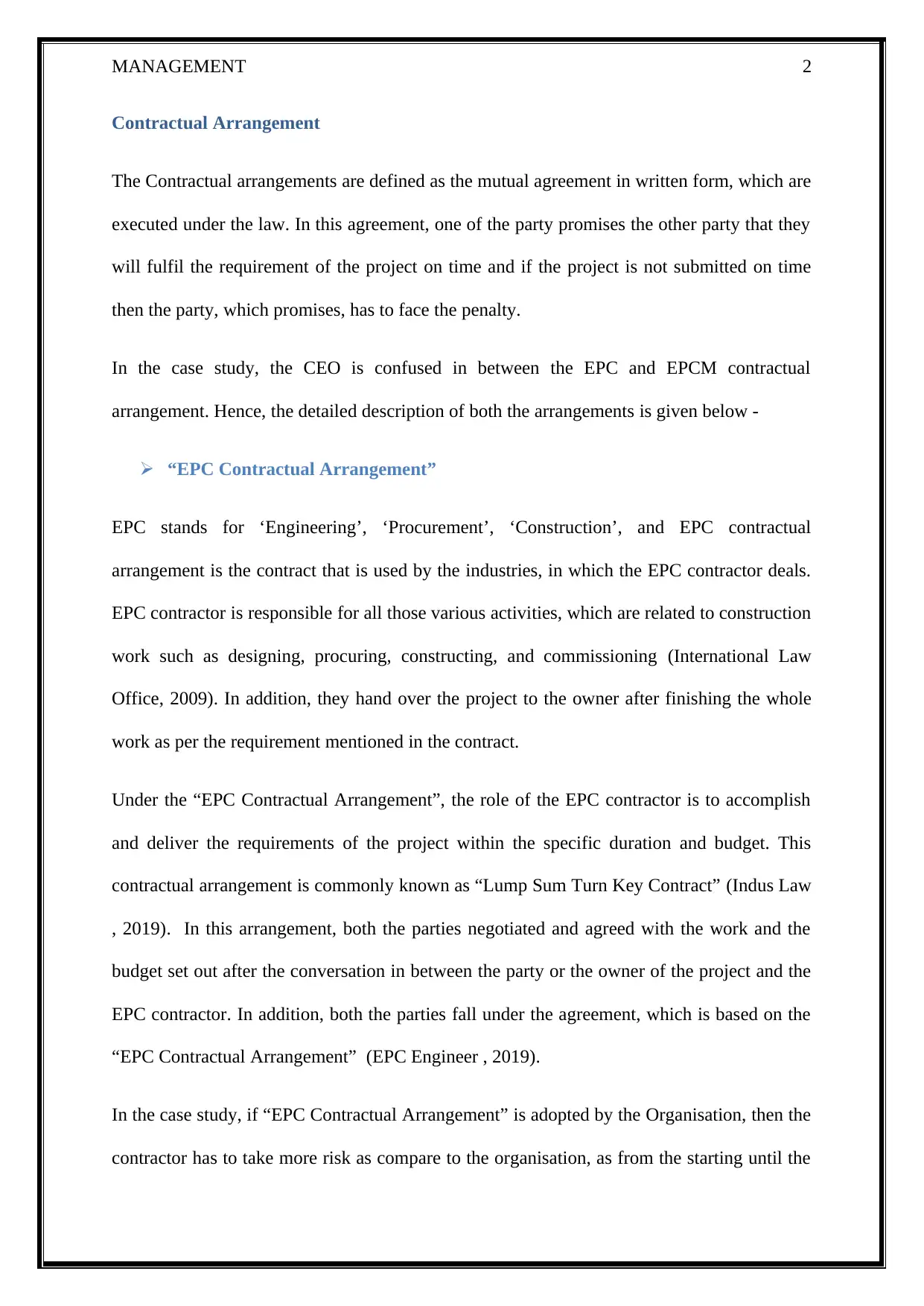
MANAGEMENT 2
Contractual Arrangement
The Contractual arrangements are defined as the mutual agreement in written form, which are
executed under the law. In this agreement, one of the party promises the other party that they
will fulfil the requirement of the project on time and if the project is not submitted on time
then the party, which promises, has to face the penalty.
In the case study, the CEO is confused in between the EPC and EPCM contractual
arrangement. Hence, the detailed description of both the arrangements is given below -
“EPC Contractual Arrangement”
EPC stands for ‘Engineering’, ‘Procurement’, ‘Construction’, and EPC contractual
arrangement is the contract that is used by the industries, in which the EPC contractor deals.
EPC contractor is responsible for all those various activities, which are related to construction
work such as designing, procuring, constructing, and commissioning (International Law
Office, 2009). In addition, they hand over the project to the owner after finishing the whole
work as per the requirement mentioned in the contract.
Under the “EPC Contractual Arrangement”, the role of the EPC contractor is to accomplish
and deliver the requirements of the project within the specific duration and budget. This
contractual arrangement is commonly known as “Lump Sum Turn Key Contract” (Indus Law
, 2019). In this arrangement, both the parties negotiated and agreed with the work and the
budget set out after the conversation in between the party or the owner of the project and the
EPC contractor. In addition, both the parties fall under the agreement, which is based on the
“EPC Contractual Arrangement” (EPC Engineer , 2019).
In the case study, if “EPC Contractual Arrangement” is adopted by the Organisation, then the
contractor has to take more risk as compare to the organisation, as from the starting until the
Contractual Arrangement
The Contractual arrangements are defined as the mutual agreement in written form, which are
executed under the law. In this agreement, one of the party promises the other party that they
will fulfil the requirement of the project on time and if the project is not submitted on time
then the party, which promises, has to face the penalty.
In the case study, the CEO is confused in between the EPC and EPCM contractual
arrangement. Hence, the detailed description of both the arrangements is given below -
“EPC Contractual Arrangement”
EPC stands for ‘Engineering’, ‘Procurement’, ‘Construction’, and EPC contractual
arrangement is the contract that is used by the industries, in which the EPC contractor deals.
EPC contractor is responsible for all those various activities, which are related to construction
work such as designing, procuring, constructing, and commissioning (International Law
Office, 2009). In addition, they hand over the project to the owner after finishing the whole
work as per the requirement mentioned in the contract.
Under the “EPC Contractual Arrangement”, the role of the EPC contractor is to accomplish
and deliver the requirements of the project within the specific duration and budget. This
contractual arrangement is commonly known as “Lump Sum Turn Key Contract” (Indus Law
, 2019). In this arrangement, both the parties negotiated and agreed with the work and the
budget set out after the conversation in between the party or the owner of the project and the
EPC contractor. In addition, both the parties fall under the agreement, which is based on the
“EPC Contractual Arrangement” (EPC Engineer , 2019).
In the case study, if “EPC Contractual Arrangement” is adopted by the Organisation, then the
contractor has to take more risk as compare to the organisation, as from the starting until the
⊘ This is a preview!⊘
Do you want full access?
Subscribe today to unlock all pages.

Trusted by 1+ million students worldwide
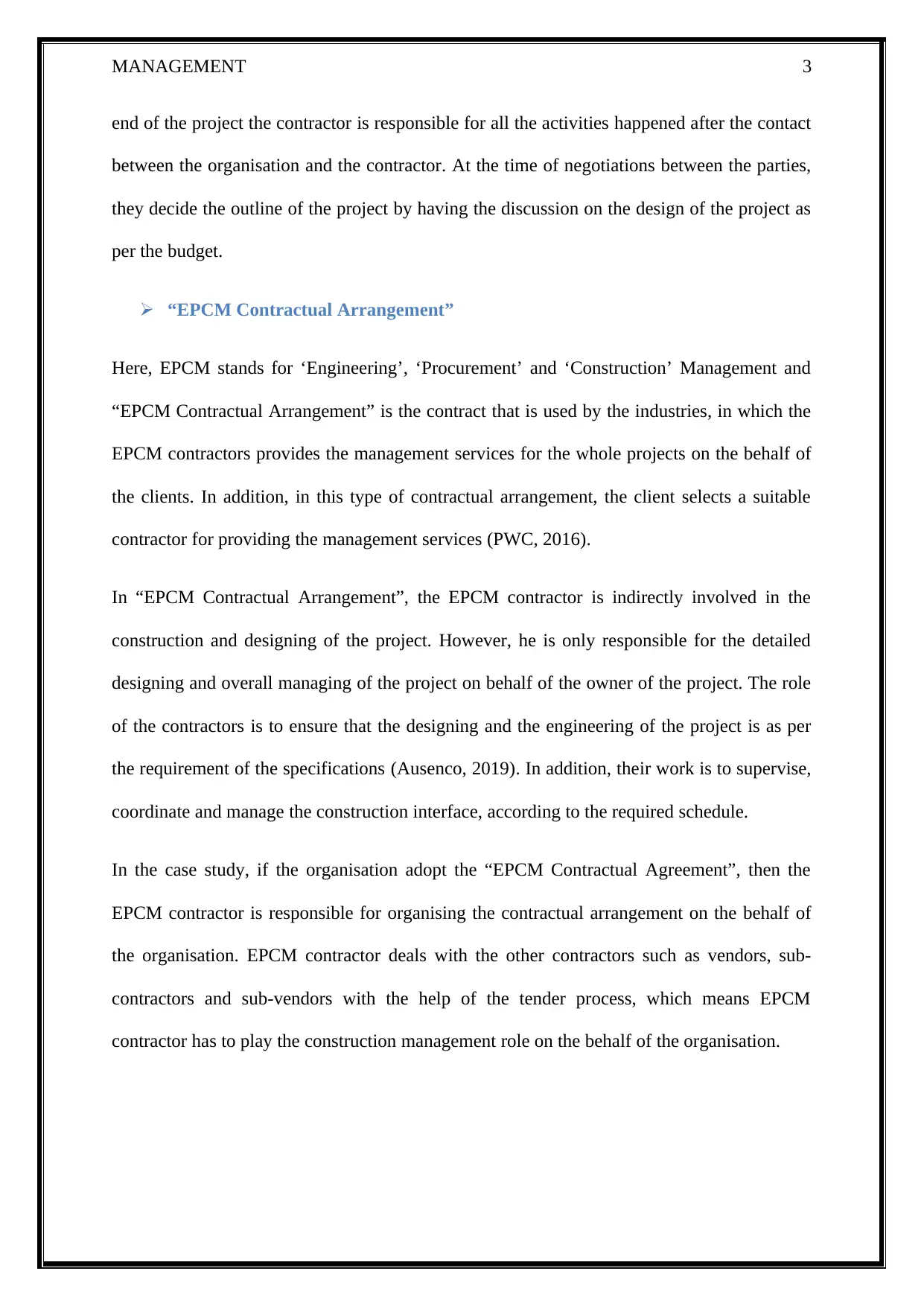
MANAGEMENT 3
end of the project the contractor is responsible for all the activities happened after the contact
between the organisation and the contractor. At the time of negotiations between the parties,
they decide the outline of the project by having the discussion on the design of the project as
per the budget.
“EPCM Contractual Arrangement”
Here, EPCM stands for ‘Engineering’, ‘Procurement’ and ‘Construction’ Management and
“EPCM Contractual Arrangement” is the contract that is used by the industries, in which the
EPCM contractors provides the management services for the whole projects on the behalf of
the clients. In addition, in this type of contractual arrangement, the client selects a suitable
contractor for providing the management services (PWC, 2016).
In “EPCM Contractual Arrangement”, the EPCM contractor is indirectly involved in the
construction and designing of the project. However, he is only responsible for the detailed
designing and overall managing of the project on behalf of the owner of the project. The role
of the contractors is to ensure that the designing and the engineering of the project is as per
the requirement of the specifications (Ausenco, 2019). In addition, their work is to supervise,
coordinate and manage the construction interface, according to the required schedule.
In the case study, if the organisation adopt the “EPCM Contractual Agreement”, then the
EPCM contractor is responsible for organising the contractual arrangement on the behalf of
the organisation. EPCM contractor deals with the other contractors such as vendors, sub-
contractors and sub-vendors with the help of the tender process, which means EPCM
contractor has to play the construction management role on the behalf of the organisation.
end of the project the contractor is responsible for all the activities happened after the contact
between the organisation and the contractor. At the time of negotiations between the parties,
they decide the outline of the project by having the discussion on the design of the project as
per the budget.
“EPCM Contractual Arrangement”
Here, EPCM stands for ‘Engineering’, ‘Procurement’ and ‘Construction’ Management and
“EPCM Contractual Arrangement” is the contract that is used by the industries, in which the
EPCM contractors provides the management services for the whole projects on the behalf of
the clients. In addition, in this type of contractual arrangement, the client selects a suitable
contractor for providing the management services (PWC, 2016).
In “EPCM Contractual Arrangement”, the EPCM contractor is indirectly involved in the
construction and designing of the project. However, he is only responsible for the detailed
designing and overall managing of the project on behalf of the owner of the project. The role
of the contractors is to ensure that the designing and the engineering of the project is as per
the requirement of the specifications (Ausenco, 2019). In addition, their work is to supervise,
coordinate and manage the construction interface, according to the required schedule.
In the case study, if the organisation adopt the “EPCM Contractual Agreement”, then the
EPCM contractor is responsible for organising the contractual arrangement on the behalf of
the organisation. EPCM contractor deals with the other contractors such as vendors, sub-
contractors and sub-vendors with the help of the tender process, which means EPCM
contractor has to play the construction management role on the behalf of the organisation.
Paraphrase This Document
Need a fresh take? Get an instant paraphrase of this document with our AI Paraphraser
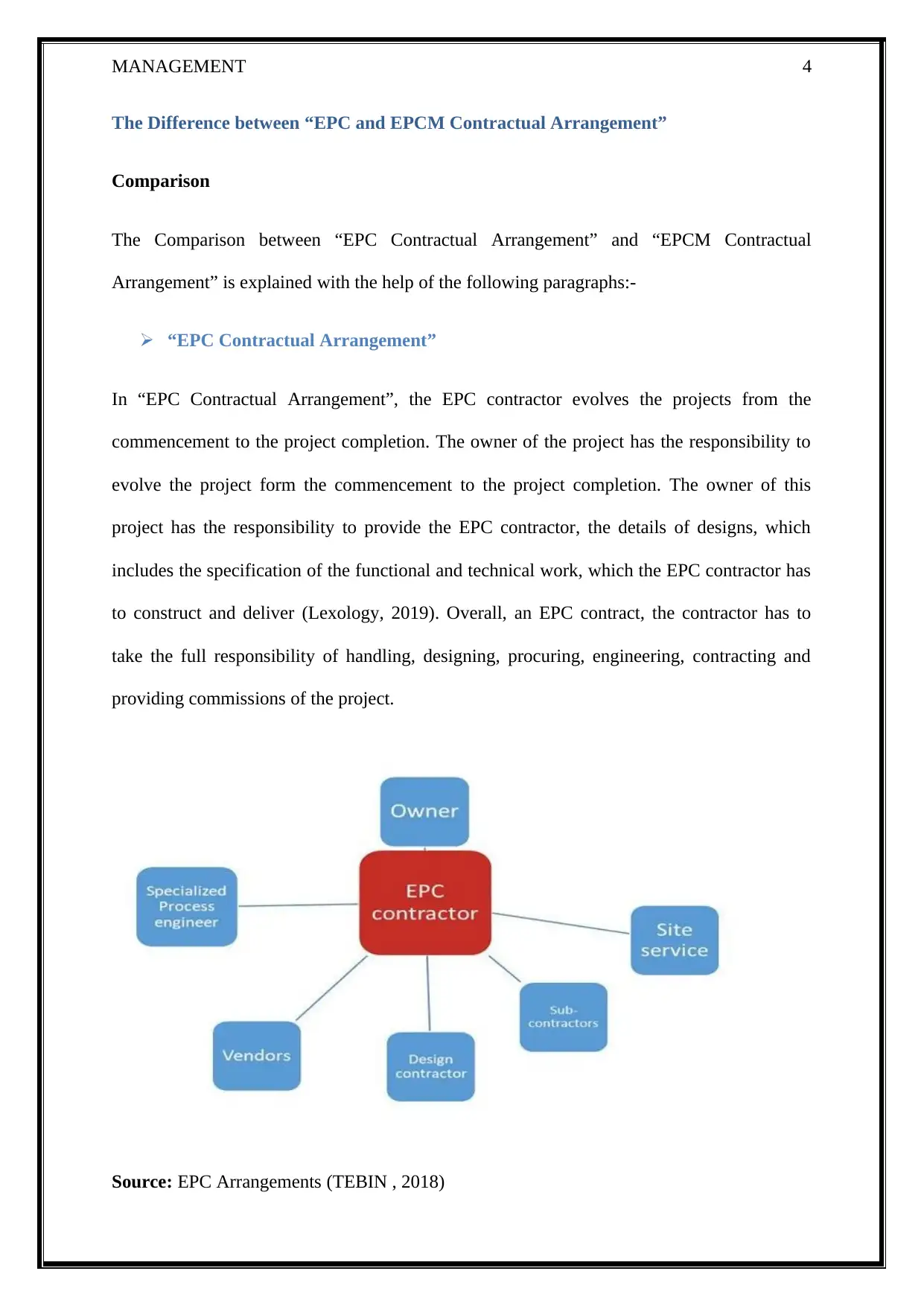
MANAGEMENT 4
The Difference between “EPC and EPCM Contractual Arrangement”
Comparison
The Comparison between “EPC Contractual Arrangement” and “EPCM Contractual
Arrangement” is explained with the help of the following paragraphs:-
“EPC Contractual Arrangement”
In “EPC Contractual Arrangement”, the EPC contractor evolves the projects from the
commencement to the project completion. The owner of the project has the responsibility to
evolve the project form the commencement to the project completion. The owner of this
project has the responsibility to provide the EPC contractor, the details of designs, which
includes the specification of the functional and technical work, which the EPC contractor has
to construct and deliver (Lexology, 2019). Overall, an EPC contract, the contractor has to
take the full responsibility of handling, designing, procuring, engineering, contracting and
providing commissions of the project.
Source: EPC Arrangements (TEBIN , 2018)
The Difference between “EPC and EPCM Contractual Arrangement”
Comparison
The Comparison between “EPC Contractual Arrangement” and “EPCM Contractual
Arrangement” is explained with the help of the following paragraphs:-
“EPC Contractual Arrangement”
In “EPC Contractual Arrangement”, the EPC contractor evolves the projects from the
commencement to the project completion. The owner of the project has the responsibility to
evolve the project form the commencement to the project completion. The owner of this
project has the responsibility to provide the EPC contractor, the details of designs, which
includes the specification of the functional and technical work, which the EPC contractor has
to construct and deliver (Lexology, 2019). Overall, an EPC contract, the contractor has to
take the full responsibility of handling, designing, procuring, engineering, contracting and
providing commissions of the project.
Source: EPC Arrangements (TEBIN , 2018)
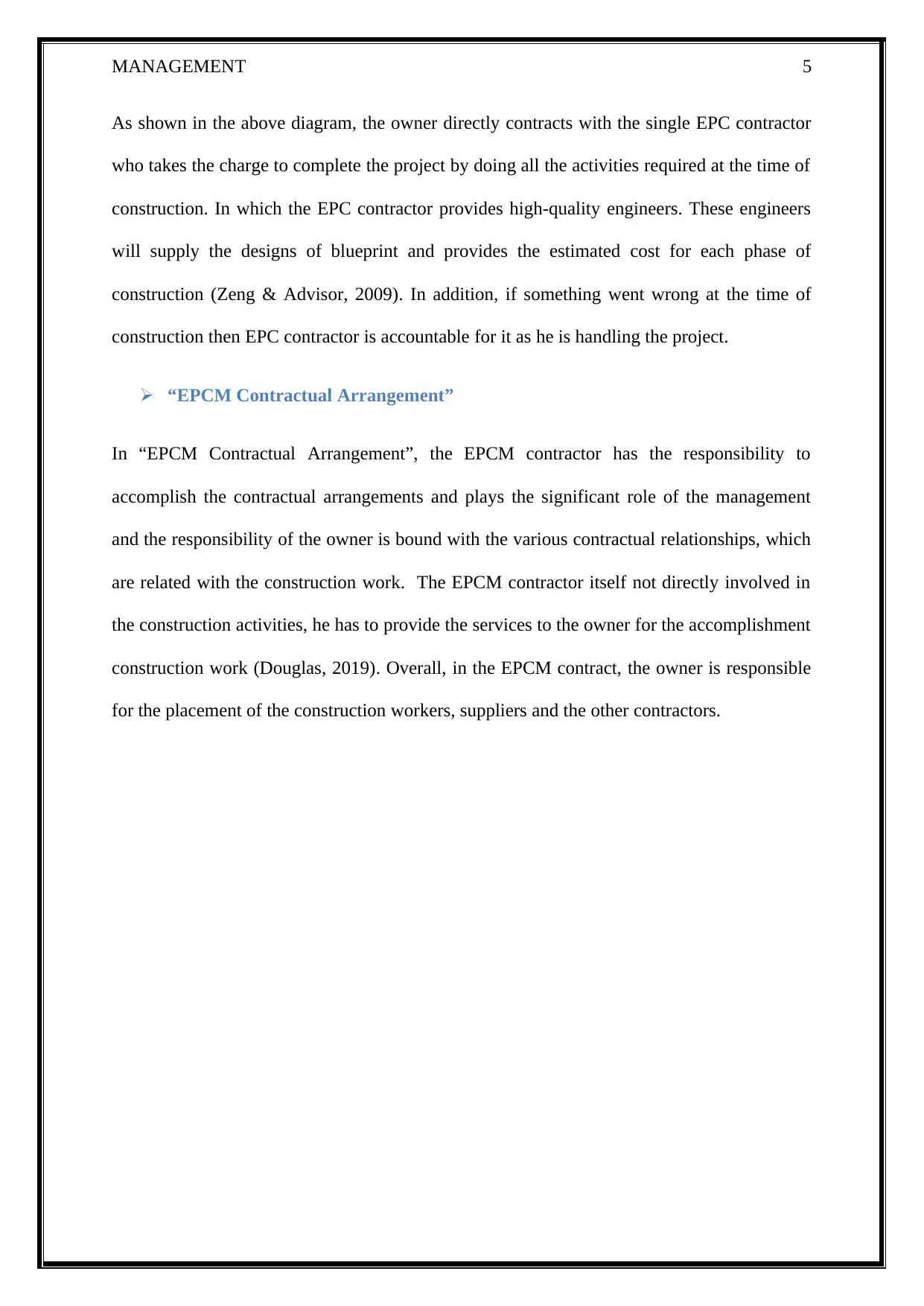
MANAGEMENT 5
As shown in the above diagram, the owner directly contracts with the single EPC contractor
who takes the charge to complete the project by doing all the activities required at the time of
construction. In which the EPC contractor provides high-quality engineers. These engineers
will supply the designs of blueprint and provides the estimated cost for each phase of
construction (Zeng & Advisor, 2009). In addition, if something went wrong at the time of
construction then EPC contractor is accountable for it as he is handling the project.
“EPCM Contractual Arrangement”
In “EPCM Contractual Arrangement”, the EPCM contractor has the responsibility to
accomplish the contractual arrangements and plays the significant role of the management
and the responsibility of the owner is bound with the various contractual relationships, which
are related with the construction work. The EPCM contractor itself not directly involved in
the construction activities, he has to provide the services to the owner for the accomplishment
construction work (Douglas, 2019). Overall, in the EPCM contract, the owner is responsible
for the placement of the construction workers, suppliers and the other contractors.
As shown in the above diagram, the owner directly contracts with the single EPC contractor
who takes the charge to complete the project by doing all the activities required at the time of
construction. In which the EPC contractor provides high-quality engineers. These engineers
will supply the designs of blueprint and provides the estimated cost for each phase of
construction (Zeng & Advisor, 2009). In addition, if something went wrong at the time of
construction then EPC contractor is accountable for it as he is handling the project.
“EPCM Contractual Arrangement”
In “EPCM Contractual Arrangement”, the EPCM contractor has the responsibility to
accomplish the contractual arrangements and plays the significant role of the management
and the responsibility of the owner is bound with the various contractual relationships, which
are related with the construction work. The EPCM contractor itself not directly involved in
the construction activities, he has to provide the services to the owner for the accomplishment
construction work (Douglas, 2019). Overall, in the EPCM contract, the owner is responsible
for the placement of the construction workers, suppliers and the other contractors.
⊘ This is a preview!⊘
Do you want full access?
Subscribe today to unlock all pages.

Trusted by 1+ million students worldwide
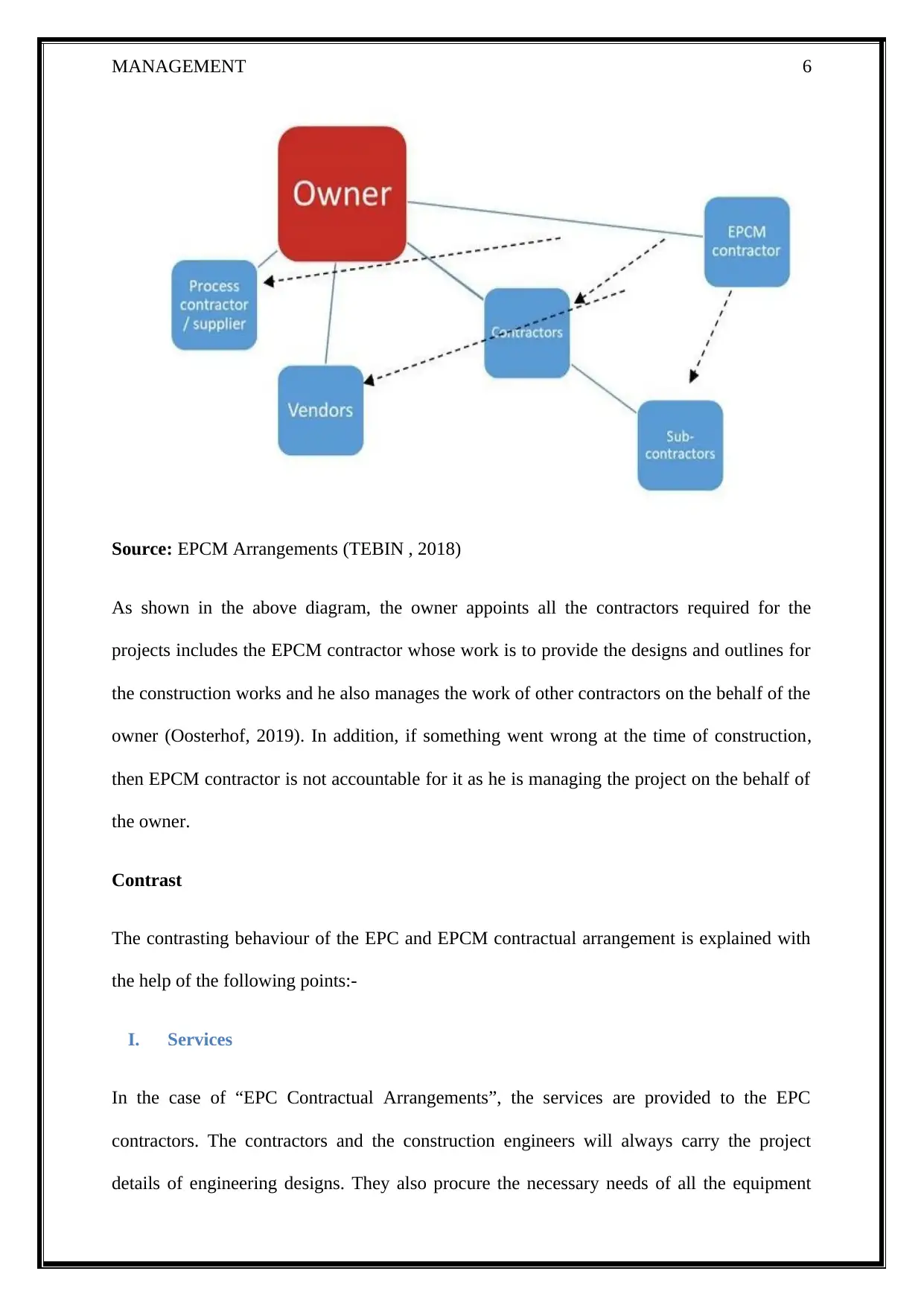
MANAGEMENT 6
Source: EPCM Arrangements (TEBIN , 2018)
As shown in the above diagram, the owner appoints all the contractors required for the
projects includes the EPCM contractor whose work is to provide the designs and outlines for
the construction works and he also manages the work of other contractors on the behalf of the
owner (Oosterhof, 2019). In addition, if something went wrong at the time of construction,
then EPCM contractor is not accountable for it as he is managing the project on the behalf of
the owner.
Contrast
The contrasting behaviour of the EPC and EPCM contractual arrangement is explained with
the help of the following points:-
I. Services
In the case of “EPC Contractual Arrangements”, the services are provided to the EPC
contractors. The contractors and the construction engineers will always carry the project
details of engineering designs. They also procure the necessary needs of all the equipment
Source: EPCM Arrangements (TEBIN , 2018)
As shown in the above diagram, the owner appoints all the contractors required for the
projects includes the EPCM contractor whose work is to provide the designs and outlines for
the construction works and he also manages the work of other contractors on the behalf of the
owner (Oosterhof, 2019). In addition, if something went wrong at the time of construction,
then EPCM contractor is not accountable for it as he is managing the project on the behalf of
the owner.
Contrast
The contrasting behaviour of the EPC and EPCM contractual arrangement is explained with
the help of the following points:-
I. Services
In the case of “EPC Contractual Arrangements”, the services are provided to the EPC
contractors. The contractors and the construction engineers will always carry the project
details of engineering designs. They also procure the necessary needs of all the equipment
Paraphrase This Document
Need a fresh take? Get an instant paraphrase of this document with our AI Paraphraser
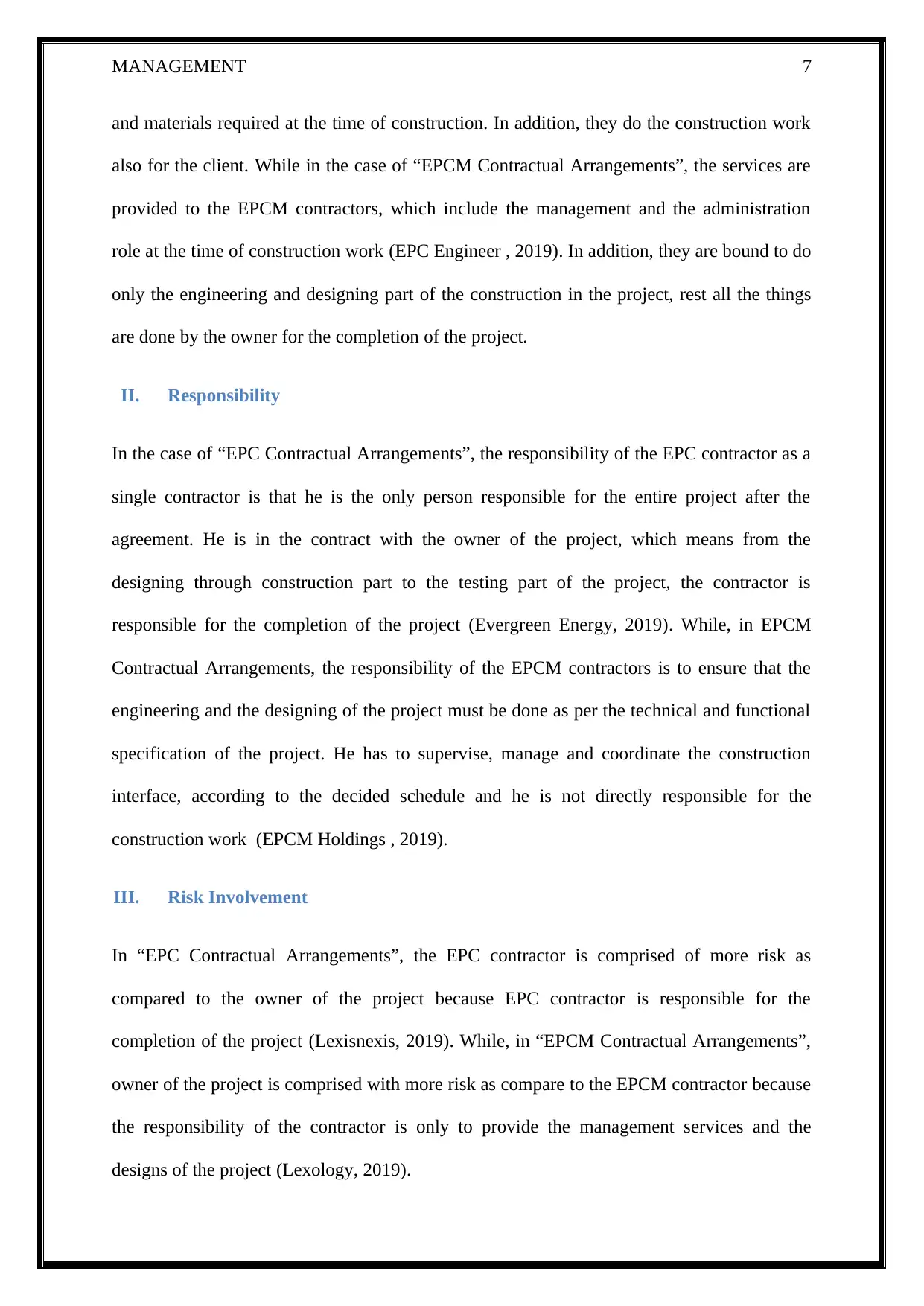
MANAGEMENT 7
and materials required at the time of construction. In addition, they do the construction work
also for the client. While in the case of “EPCM Contractual Arrangements”, the services are
provided to the EPCM contractors, which include the management and the administration
role at the time of construction work (EPC Engineer , 2019). In addition, they are bound to do
only the engineering and designing part of the construction in the project, rest all the things
are done by the owner for the completion of the project.
II. Responsibility
In the case of “EPC Contractual Arrangements”, the responsibility of the EPC contractor as a
single contractor is that he is the only person responsible for the entire project after the
agreement. He is in the contract with the owner of the project, which means from the
designing through construction part to the testing part of the project, the contractor is
responsible for the completion of the project (Evergreen Energy, 2019). While, in EPCM
Contractual Arrangements, the responsibility of the EPCM contractors is to ensure that the
engineering and the designing of the project must be done as per the technical and functional
specification of the project. He has to supervise, manage and coordinate the construction
interface, according to the decided schedule and he is not directly responsible for the
construction work (EPCM Holdings , 2019).
III. Risk Involvement
In “EPC Contractual Arrangements”, the EPC contractor is comprised of more risk as
compared to the owner of the project because EPC contractor is responsible for the
completion of the project (Lexisnexis, 2019). While, in “EPCM Contractual Arrangements”,
owner of the project is comprised with more risk as compare to the EPCM contractor because
the responsibility of the contractor is only to provide the management services and the
designs of the project (Lexology, 2019).
and materials required at the time of construction. In addition, they do the construction work
also for the client. While in the case of “EPCM Contractual Arrangements”, the services are
provided to the EPCM contractors, which include the management and the administration
role at the time of construction work (EPC Engineer , 2019). In addition, they are bound to do
only the engineering and designing part of the construction in the project, rest all the things
are done by the owner for the completion of the project.
II. Responsibility
In the case of “EPC Contractual Arrangements”, the responsibility of the EPC contractor as a
single contractor is that he is the only person responsible for the entire project after the
agreement. He is in the contract with the owner of the project, which means from the
designing through construction part to the testing part of the project, the contractor is
responsible for the completion of the project (Evergreen Energy, 2019). While, in EPCM
Contractual Arrangements, the responsibility of the EPCM contractors is to ensure that the
engineering and the designing of the project must be done as per the technical and functional
specification of the project. He has to supervise, manage and coordinate the construction
interface, according to the decided schedule and he is not directly responsible for the
construction work (EPCM Holdings , 2019).
III. Risk Involvement
In “EPC Contractual Arrangements”, the EPC contractor is comprised of more risk as
compared to the owner of the project because EPC contractor is responsible for the
completion of the project (Lexisnexis, 2019). While, in “EPCM Contractual Arrangements”,
owner of the project is comprised with more risk as compare to the EPCM contractor because
the responsibility of the contractor is only to provide the management services and the
designs of the project (Lexology, 2019).
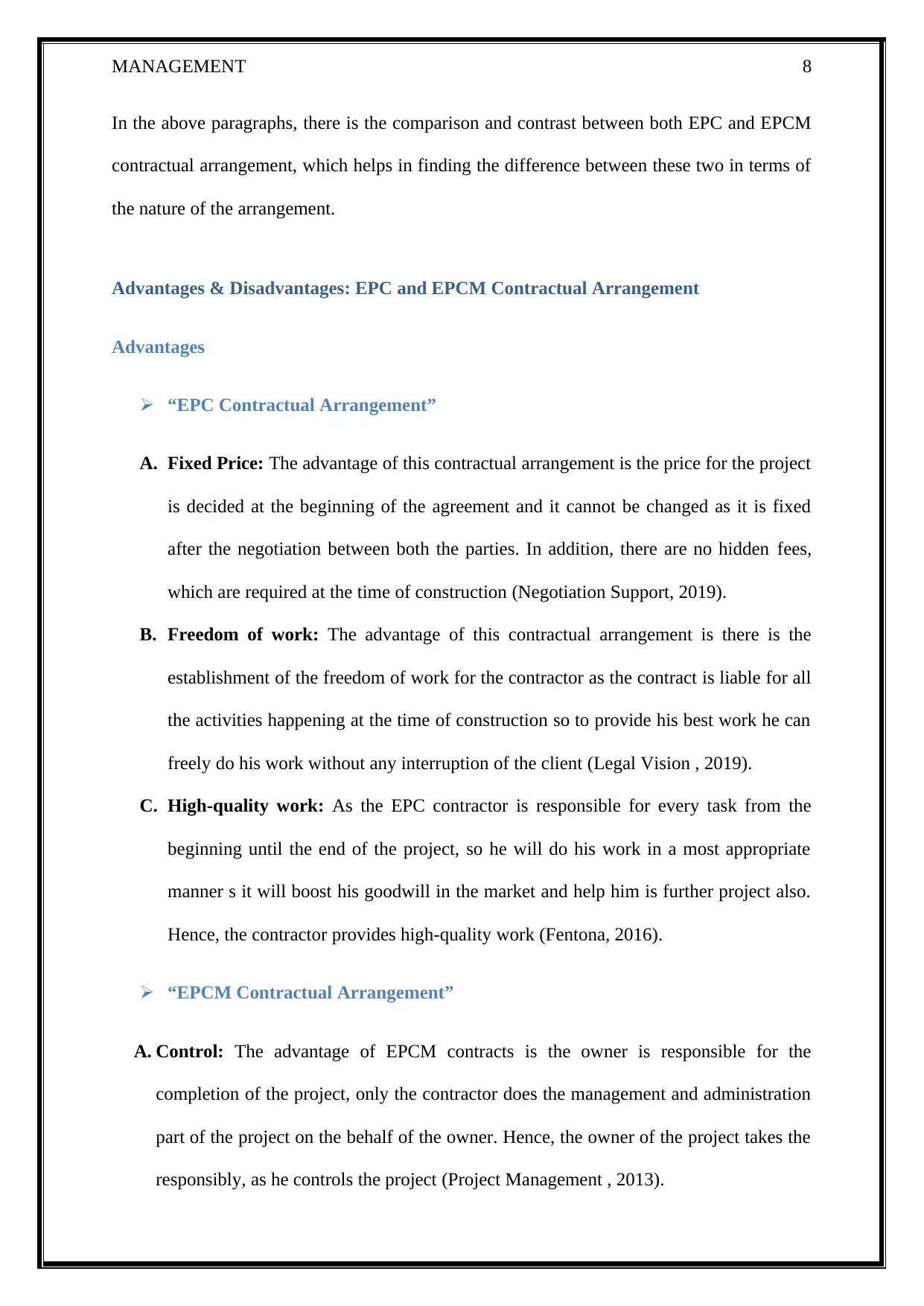
MANAGEMENT 8
In the above paragraphs, there is the comparison and contrast between both EPC and EPCM
contractual arrangement, which helps in finding the difference between these two in terms of
the nature of the arrangement.
Advantages & Disadvantages: EPC and EPCM Contractual Arrangement
Advantages
“EPC Contractual Arrangement”
A. Fixed Price: The advantage of this contractual arrangement is the price for the project
is decided at the beginning of the agreement and it cannot be changed as it is fixed
after the negotiation between both the parties. In addition, there are no hidden fees,
which are required at the time of construction (Negotiation Support, 2019).
B. Freedom of work: The advantage of this contractual arrangement is there is the
establishment of the freedom of work for the contractor as the contract is liable for all
the activities happening at the time of construction so to provide his best work he can
freely do his work without any interruption of the client (Legal Vision , 2019).
C. High-quality work: As the EPC contractor is responsible for every task from the
beginning until the end of the project, so he will do his work in a most appropriate
manner s it will boost his goodwill in the market and help him is further project also.
Hence, the contractor provides high-quality work (Fentona, 2016).
“EPCM Contractual Arrangement”
A. Control: The advantage of EPCM contracts is the owner is responsible for the
completion of the project, only the contractor does the management and administration
part of the project on the behalf of the owner. Hence, the owner of the project takes the
responsibly, as he controls the project (Project Management , 2013).
In the above paragraphs, there is the comparison and contrast between both EPC and EPCM
contractual arrangement, which helps in finding the difference between these two in terms of
the nature of the arrangement.
Advantages & Disadvantages: EPC and EPCM Contractual Arrangement
Advantages
“EPC Contractual Arrangement”
A. Fixed Price: The advantage of this contractual arrangement is the price for the project
is decided at the beginning of the agreement and it cannot be changed as it is fixed
after the negotiation between both the parties. In addition, there are no hidden fees,
which are required at the time of construction (Negotiation Support, 2019).
B. Freedom of work: The advantage of this contractual arrangement is there is the
establishment of the freedom of work for the contractor as the contract is liable for all
the activities happening at the time of construction so to provide his best work he can
freely do his work without any interruption of the client (Legal Vision , 2019).
C. High-quality work: As the EPC contractor is responsible for every task from the
beginning until the end of the project, so he will do his work in a most appropriate
manner s it will boost his goodwill in the market and help him is further project also.
Hence, the contractor provides high-quality work (Fentona, 2016).
“EPCM Contractual Arrangement”
A. Control: The advantage of EPCM contracts is the owner is responsible for the
completion of the project, only the contractor does the management and administration
part of the project on the behalf of the owner. Hence, the owner of the project takes the
responsibly, as he controls the project (Project Management , 2013).
⊘ This is a preview!⊘
Do you want full access?
Subscribe today to unlock all pages.

Trusted by 1+ million students worldwide
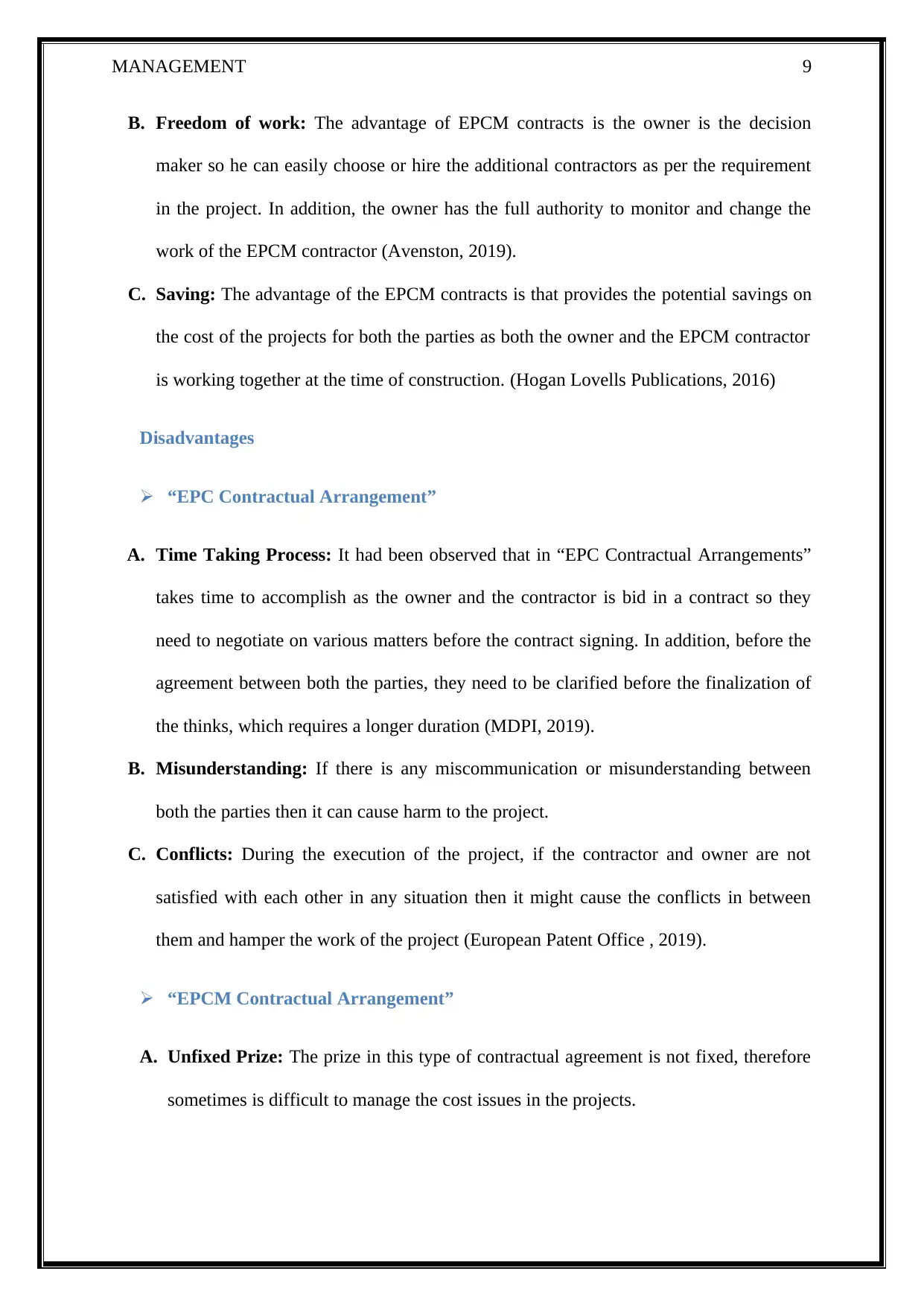
MANAGEMENT 9
B. Freedom of work: The advantage of EPCM contracts is the owner is the decision
maker so he can easily choose or hire the additional contractors as per the requirement
in the project. In addition, the owner has the full authority to monitor and change the
work of the EPCM contractor (Avenston, 2019).
C. Saving: The advantage of the EPCM contracts is that provides the potential savings on
the cost of the projects for both the parties as both the owner and the EPCM contractor
is working together at the time of construction. (Hogan Lovells Publications, 2016)
Disadvantages
“EPC Contractual Arrangement”
A. Time Taking Process: It had been observed that in “EPC Contractual Arrangements”
takes time to accomplish as the owner and the contractor is bid in a contract so they
need to negotiate on various matters before the contract signing. In addition, before the
agreement between both the parties, they need to be clarified before the finalization of
the thinks, which requires a longer duration (MDPI, 2019).
B. Misunderstanding: If there is any miscommunication or misunderstanding between
both the parties then it can cause harm to the project.
C. Conflicts: During the execution of the project, if the contractor and owner are not
satisfied with each other in any situation then it might cause the conflicts in between
them and hamper the work of the project (European Patent Office , 2019).
“EPCM Contractual Arrangement”
A. Unfixed Prize: The prize in this type of contractual agreement is not fixed, therefore
sometimes is difficult to manage the cost issues in the projects.
B. Freedom of work: The advantage of EPCM contracts is the owner is the decision
maker so he can easily choose or hire the additional contractors as per the requirement
in the project. In addition, the owner has the full authority to monitor and change the
work of the EPCM contractor (Avenston, 2019).
C. Saving: The advantage of the EPCM contracts is that provides the potential savings on
the cost of the projects for both the parties as both the owner and the EPCM contractor
is working together at the time of construction. (Hogan Lovells Publications, 2016)
Disadvantages
“EPC Contractual Arrangement”
A. Time Taking Process: It had been observed that in “EPC Contractual Arrangements”
takes time to accomplish as the owner and the contractor is bid in a contract so they
need to negotiate on various matters before the contract signing. In addition, before the
agreement between both the parties, they need to be clarified before the finalization of
the thinks, which requires a longer duration (MDPI, 2019).
B. Misunderstanding: If there is any miscommunication or misunderstanding between
both the parties then it can cause harm to the project.
C. Conflicts: During the execution of the project, if the contractor and owner are not
satisfied with each other in any situation then it might cause the conflicts in between
them and hamper the work of the project (European Patent Office , 2019).
“EPCM Contractual Arrangement”
A. Unfixed Prize: The prize in this type of contractual agreement is not fixed, therefore
sometimes is difficult to manage the cost issues in the projects.
Paraphrase This Document
Need a fresh take? Get an instant paraphrase of this document with our AI Paraphraser
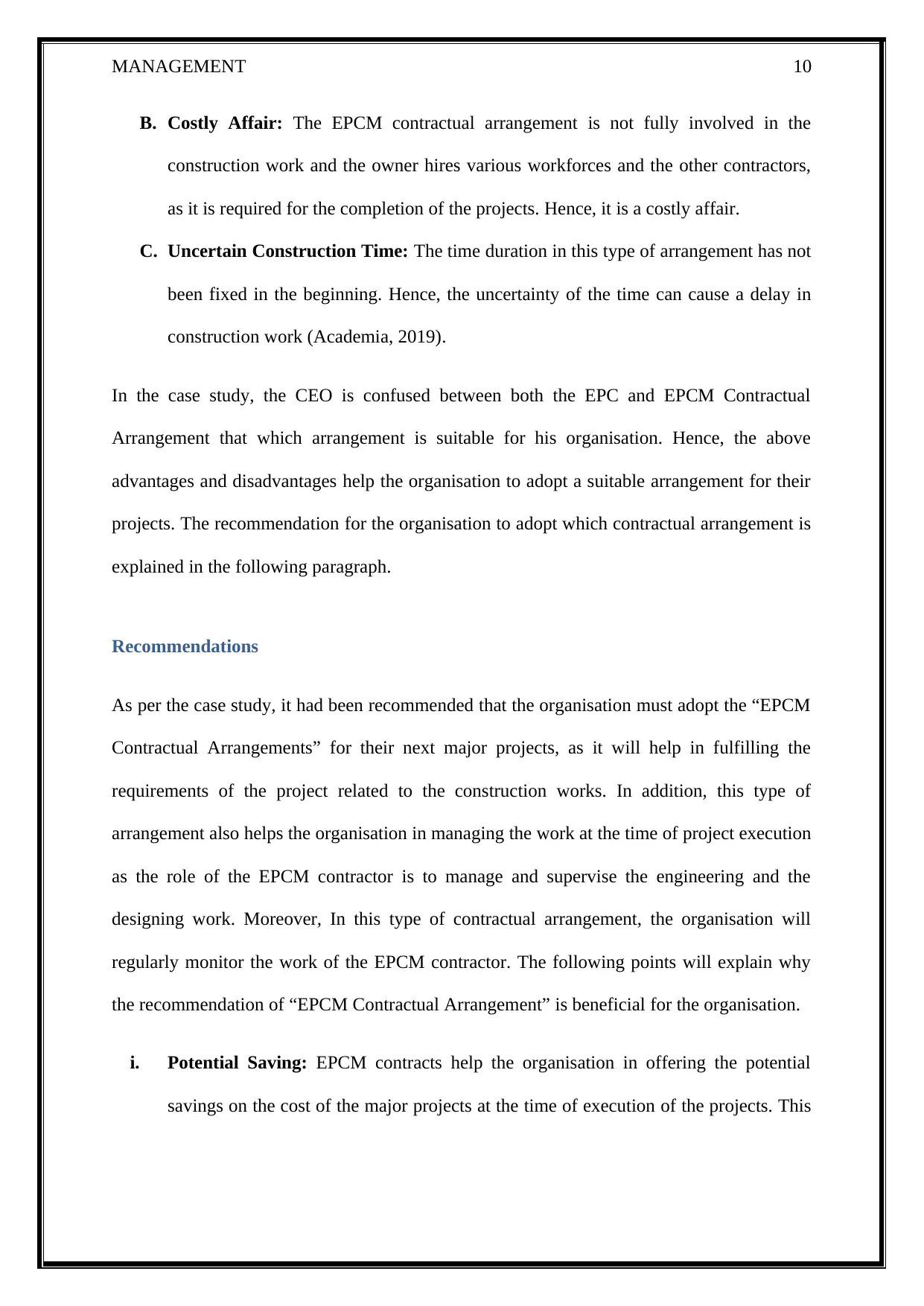
MANAGEMENT 10
B. Costly Affair: The EPCM contractual arrangement is not fully involved in the
construction work and the owner hires various workforces and the other contractors,
as it is required for the completion of the projects. Hence, it is a costly affair.
C. Uncertain Construction Time: The time duration in this type of arrangement has not
been fixed in the beginning. Hence, the uncertainty of the time can cause a delay in
construction work (Academia, 2019).
In the case study, the CEO is confused between both the EPC and EPCM Contractual
Arrangement that which arrangement is suitable for his organisation. Hence, the above
advantages and disadvantages help the organisation to adopt a suitable arrangement for their
projects. The recommendation for the organisation to adopt which contractual arrangement is
explained in the following paragraph.
Recommendations
As per the case study, it had been recommended that the organisation must adopt the “EPCM
Contractual Arrangements” for their next major projects, as it will help in fulfilling the
requirements of the project related to the construction works. In addition, this type of
arrangement also helps the organisation in managing the work at the time of project execution
as the role of the EPCM contractor is to manage and supervise the engineering and the
designing work. Moreover, In this type of contractual arrangement, the organisation will
regularly monitor the work of the EPCM contractor. The following points will explain why
the recommendation of “EPCM Contractual Arrangement” is beneficial for the organisation.
i. Potential Saving: EPCM contracts help the organisation in offering the potential
savings on the cost of the major projects at the time of execution of the projects. This
B. Costly Affair: The EPCM contractual arrangement is not fully involved in the
construction work and the owner hires various workforces and the other contractors,
as it is required for the completion of the projects. Hence, it is a costly affair.
C. Uncertain Construction Time: The time duration in this type of arrangement has not
been fixed in the beginning. Hence, the uncertainty of the time can cause a delay in
construction work (Academia, 2019).
In the case study, the CEO is confused between both the EPC and EPCM Contractual
Arrangement that which arrangement is suitable for his organisation. Hence, the above
advantages and disadvantages help the organisation to adopt a suitable arrangement for their
projects. The recommendation for the organisation to adopt which contractual arrangement is
explained in the following paragraph.
Recommendations
As per the case study, it had been recommended that the organisation must adopt the “EPCM
Contractual Arrangements” for their next major projects, as it will help in fulfilling the
requirements of the project related to the construction works. In addition, this type of
arrangement also helps the organisation in managing the work at the time of project execution
as the role of the EPCM contractor is to manage and supervise the engineering and the
designing work. Moreover, In this type of contractual arrangement, the organisation will
regularly monitor the work of the EPCM contractor. The following points will explain why
the recommendation of “EPCM Contractual Arrangement” is beneficial for the organisation.
i. Potential Saving: EPCM contracts help the organisation in offering the potential
savings on the cost of the major projects at the time of execution of the projects. This
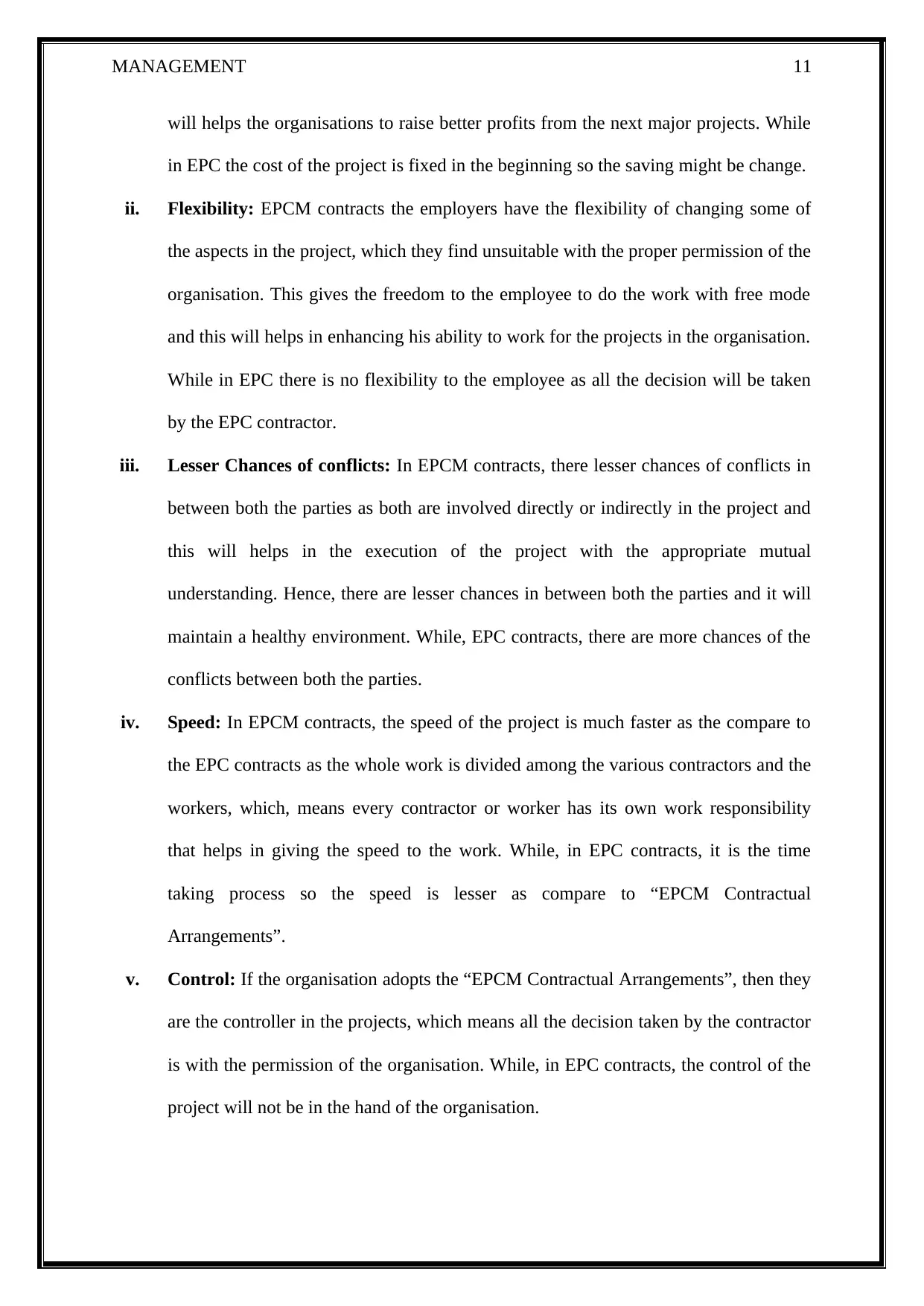
MANAGEMENT 11
will helps the organisations to raise better profits from the next major projects. While
in EPC the cost of the project is fixed in the beginning so the saving might be change.
ii. Flexibility: EPCM contracts the employers have the flexibility of changing some of
the aspects in the project, which they find unsuitable with the proper permission of the
organisation. This gives the freedom to the employee to do the work with free mode
and this will helps in enhancing his ability to work for the projects in the organisation.
While in EPC there is no flexibility to the employee as all the decision will be taken
by the EPC contractor.
iii. Lesser Chances of conflicts: In EPCM contracts, there lesser chances of conflicts in
between both the parties as both are involved directly or indirectly in the project and
this will helps in the execution of the project with the appropriate mutual
understanding. Hence, there are lesser chances in between both the parties and it will
maintain a healthy environment. While, EPC contracts, there are more chances of the
conflicts between both the parties.
iv. Speed: In EPCM contracts, the speed of the project is much faster as the compare to
the EPC contracts as the whole work is divided among the various contractors and the
workers, which, means every contractor or worker has its own work responsibility
that helps in giving the speed to the work. While, in EPC contracts, it is the time
taking process so the speed is lesser as compare to “EPCM Contractual
Arrangements”.
v. Control: If the organisation adopts the “EPCM Contractual Arrangements”, then they
are the controller in the projects, which means all the decision taken by the contractor
is with the permission of the organisation. While, in EPC contracts, the control of the
project will not be in the hand of the organisation.
will helps the organisations to raise better profits from the next major projects. While
in EPC the cost of the project is fixed in the beginning so the saving might be change.
ii. Flexibility: EPCM contracts the employers have the flexibility of changing some of
the aspects in the project, which they find unsuitable with the proper permission of the
organisation. This gives the freedom to the employee to do the work with free mode
and this will helps in enhancing his ability to work for the projects in the organisation.
While in EPC there is no flexibility to the employee as all the decision will be taken
by the EPC contractor.
iii. Lesser Chances of conflicts: In EPCM contracts, there lesser chances of conflicts in
between both the parties as both are involved directly or indirectly in the project and
this will helps in the execution of the project with the appropriate mutual
understanding. Hence, there are lesser chances in between both the parties and it will
maintain a healthy environment. While, EPC contracts, there are more chances of the
conflicts between both the parties.
iv. Speed: In EPCM contracts, the speed of the project is much faster as the compare to
the EPC contracts as the whole work is divided among the various contractors and the
workers, which, means every contractor or worker has its own work responsibility
that helps in giving the speed to the work. While, in EPC contracts, it is the time
taking process so the speed is lesser as compare to “EPCM Contractual
Arrangements”.
v. Control: If the organisation adopts the “EPCM Contractual Arrangements”, then they
are the controller in the projects, which means all the decision taken by the contractor
is with the permission of the organisation. While, in EPC contracts, the control of the
project will not be in the hand of the organisation.
⊘ This is a preview!⊘
Do you want full access?
Subscribe today to unlock all pages.

Trusted by 1+ million students worldwide
1 out of 18
Related Documents
Your All-in-One AI-Powered Toolkit for Academic Success.
+13062052269
info@desklib.com
Available 24*7 on WhatsApp / Email
![[object Object]](/_next/static/media/star-bottom.7253800d.svg)
Unlock your academic potential
Copyright © 2020–2026 A2Z Services. All Rights Reserved. Developed and managed by ZUCOL.




